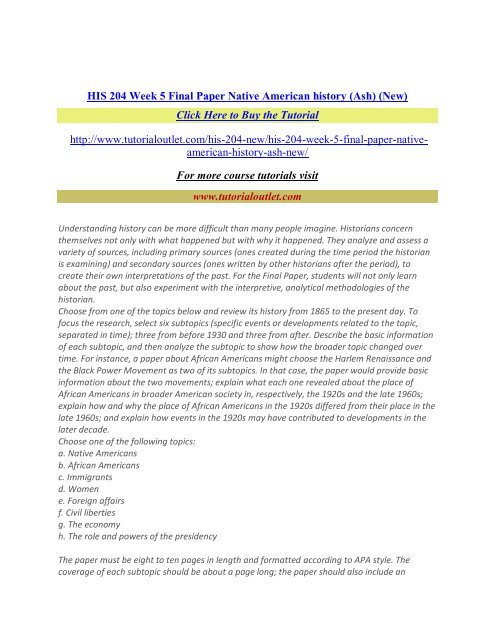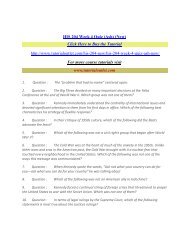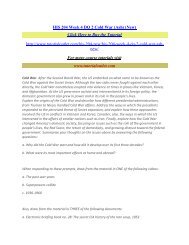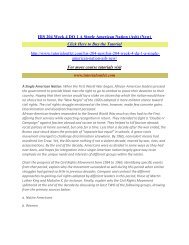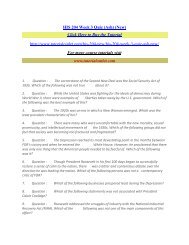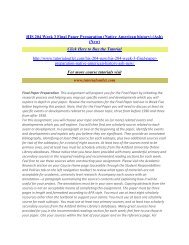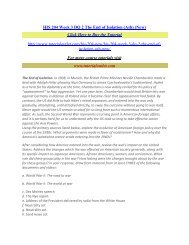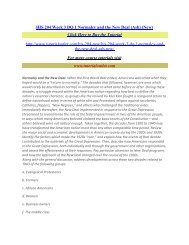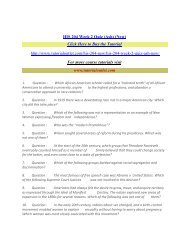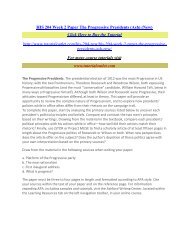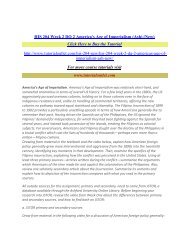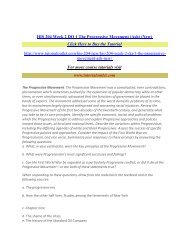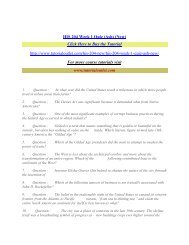HIS 204 Week 5 Final Paper Native American history (Ash) (New) / Tutorialoutlet
- No tags were found...
You also want an ePaper? Increase the reach of your titles
YUMPU automatically turns print PDFs into web optimized ePapers that Google loves.
<strong>HIS</strong> <strong>204</strong> <strong>Week</strong> 5 <strong>Final</strong> <strong>Paper</strong> <strong>Native</strong> <strong>American</strong> <strong>history</strong> (<strong>Ash</strong>) (<strong>New</strong>)<br />
Click Here to Buy the Tutorial<br />
http://www.tutorialoutlet.com/his-<strong>204</strong>-new/his-<strong>204</strong>-week-5-final-paper-nativeamerican-<strong>history</strong>-ash-new/<br />
For more course tutorials visit<br />
www.tutorialoutlet.com<br />
Understanding <strong>history</strong> can be more difficult than many people imagine. Historians concern<br />
themselves not only with what happened but with why it happened. They analyze and assess a<br />
variety of sources, including primary sources (ones created during the time period the historian<br />
is examining) and secondary sources (ones written by other historians after the period), to<br />
create their own interpretations of the past. For the <strong>Final</strong> <strong>Paper</strong>, students will not only learn<br />
about the past, but also experiment with the interpretive, analytical methodologies of the<br />
historian.<br />
Choose from one of the topics below and review its <strong>history</strong> from 1865 to the present day. To<br />
focus the research, select six subtopics (specific events or developments related to the topic,<br />
separated in time); three from before 1930 and three from after. Describe the basic information<br />
of each subtopic, and then analyze the subtopic to show how the broader topic changed over<br />
time. For instance, a paper about African <strong>American</strong>s might choose the Harlem Renaissance and<br />
the Black Power Movement as two of its subtopics. In that case, the paper would provide basic<br />
information about the two movements; explain what each one revealed about the place of<br />
African <strong>American</strong>s in broader <strong>American</strong> society in, respectively, the 1920s and the late 1960s;<br />
explain how and why the place of African <strong>American</strong>s in the 1920s differed from their place in the<br />
late 1960s; and explain how events in the 1920s may have contributed to developments in the<br />
later decade.<br />
Choose one of the following topics:<br />
a. <strong>Native</strong> <strong>American</strong>s<br />
b. African <strong>American</strong>s<br />
c. Immigrants<br />
d. Women<br />
e. Foreign affairs<br />
f. Civil liberties<br />
g. The economy<br />
h. The role and powers of the presidency<br />
The paper must be eight to ten pages in length and formatted according to APA style. The<br />
coverage of each subtopic should be about a page long; the paper should also include an
introduction and a conclusion which synthesizes and summarizes the findings of the body<br />
paragraphs, and develops a thesis—or interpretive argument—from them. You must use at<br />
least eight scholarly resources other than the textbook to support your claims. You must use at<br />
least one scholarly source for each subtopic. You must use at least two primary sources, and at<br />
least two scholarly secondary sources from the <strong>Ash</strong>ford Online Library’s databases. Many great<br />
sources have provided for you in the recommended readings section for each week; feel free to<br />
use those in your paper. Cite your sources within the text of your paper and on the reference<br />
page. For information regarding APA, including samples and tutorials, visit the <strong>Ash</strong>ford Writing<br />
Center, located within the Learning Resources tab on the left navigation toolbar, in your online<br />
course.


